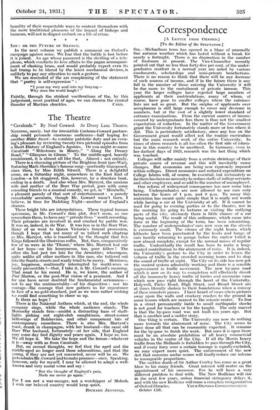Correspondence
[A LETTER FROM OXFORD.] [To the Editor of the SPECTATOR.] SIR,—Michaelmas term has opened in a blaze of unusually fine autumn weather which has lasted without a break for
nearly a fortnight. There is no diminution in the number of freshmen at present. The Vice-Chancellor recently pointed out that no less than forty-five per cent. of the under- graduates resident in a normal year are aided by various emoluments, scholarships and semi-private benefactions.
There is no reason to think that there will be any decrease of such sources of income, and if in the future there is any fall in the number of those entering the University it will be due more to the curtailment of private income. This year the larger colleges have rejected large numbers of applicants at their matriculations, many of whom, of course, have gone to smaller colleges where the entrance lists are not so great. But the surplus of applicants over acceptances is still large enough to cover any decrease in numbers, but at the cost of a slightly lower standard of entrance examinations. From the current sources of income covered by undergraduate fees there is thus not the smallest expectation of reduction. In the matter of the Government grant the University fortunately stands more or less where it did. This is particularly satisfactory, since any loss on the Government grant would affect not the routine curriculum but the main research work of the entire University. In times of stress research is all too often the first side of educa-
tion in this country to be sacrificed. In Germany, even in her darkest days of 1923, research was the last thing which was touched.
Colleges will suffer mainly from a certain shrinkage of their private source of revenue and this will inevitably cause changes. But economies are being now rigorously imposed within colleges. Direct economies and reduced expenditure on College fabrics will, of course, be essential, but fortunately so far there has been no necessity to reduce staffs of college servants and other employees, and so add to the number of unemployed. One reform of widespread consequence has now come into being. Undergraduates are now allowed to use cars only between the hours of 1 p.m. and 9 p.m. To many this
restriction has meant quite simply that it is really not worth while having a car at the University at all. If it cannot be
used for going to evening parties or to the theatre, nor in the morning for going to lectures or visiting the outlying parts of the city, obviously there is little chance of a car being useful. The result of this ordinance, which came into force at the beginning of the term, has been astonishing. The number of undergraduates' cars now seen on the streets is extremely small. The silence of the night hours, which hitherto have been punctuated by the hoots and bangs of cars hastily returning to garage before the curfew tolled is now almost complete, except for the normal noises of regular traffic. Undoubtedly the result has been to make a long- wanted contribution to the abatement of noise. It is, indeed, the University's gesture to the City in order to lessen the volume of traffic in the crowded morning hours and to stop the sound of traffic at night. The City on its side has now got the control system admirably working and there is a sensible improvement in traffic movement. The new by-pass road which is now on its way to completion will effectively divert all the immensely heavy traffic of lorries and enormous vans which now pass right through the heart of the University. Holywell, Parks Road, High Street, and Broad Street are at times literally shaken to their foundations when a convoy of these monsters passes. I have heard of cases where pictures sway upon the walls and crockery crashes to the ground in
some houses which are nearest to the seismic centre. To live in a street permanently liable to small earthquake shocks is not good for teachers or for the taught. The only marvel is that the by-pass road was not built ten years ago. But that is another and a sadder story.
One thing is certain. The University can now do nothing more towards the abatement of noise. The City seems to have done all that can be reasonably expected. It remains for the by-pass to finish the work. But once it is open there must be an absolute prohibition of all heavy conunercial vehicles in the centre of the City. If all the Morris heavy traffic from the Midlands is forbidden to pass through the City, and if every lorry over a certain tonnage is equally excluded, we may expect more quiet. The enforcement of the new Act that concerns undue noises will finally reduce our inferno to manageable proportions. The sudden death of Sir Arthur Cowley has come as a great blow to his many friends. Great interest will centre on the appointment of his successor. For he will have a very different problem to deal with. The New Bodleian will rise in the next few years, unless financial stringency delays it, and with the new Bodleian will come a complete reorganization














































 Previous page
Previous page